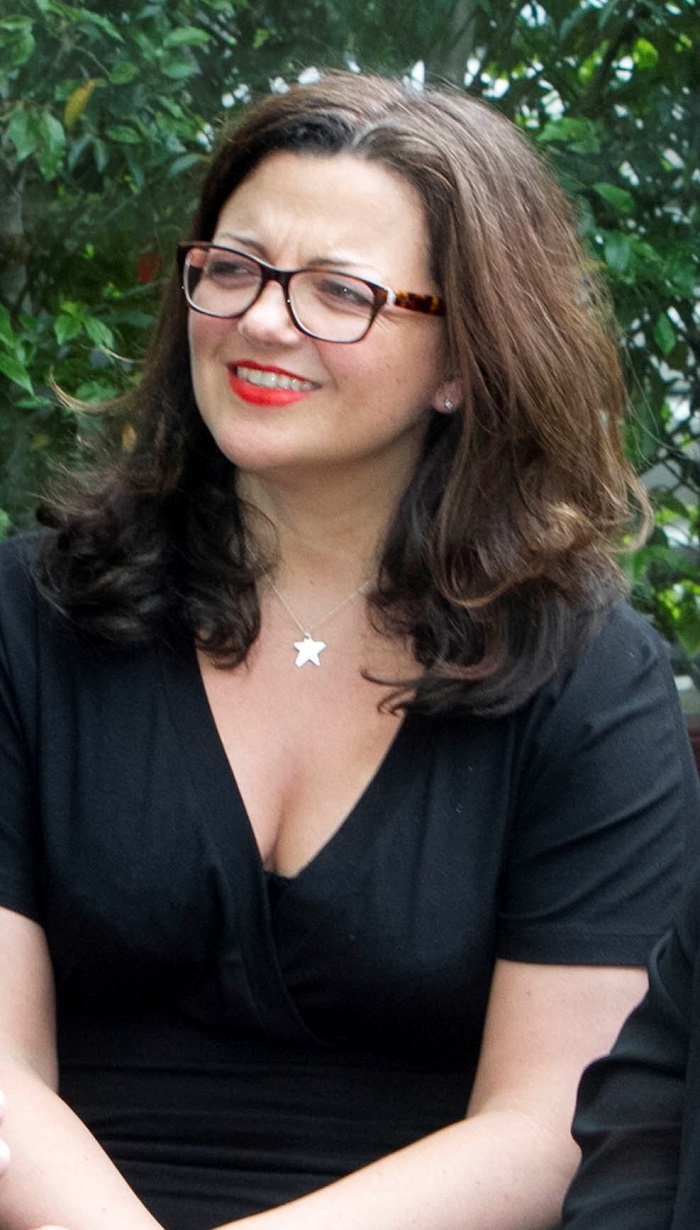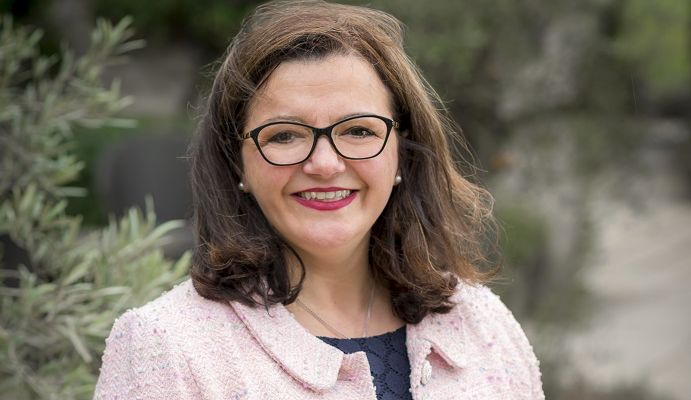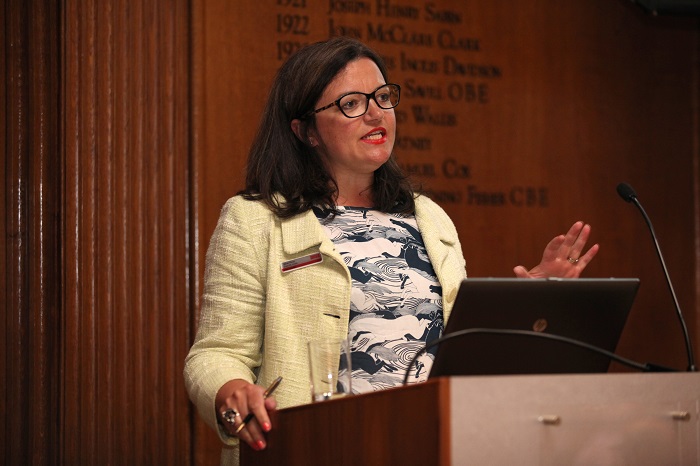PR Spotlight: Sarah Pinch, Pinch Point Communications
Having gained a reputation as an inspirational speaker and having established herself as one of the most well respected figures in PR, Sarah Pinch is a trail blazer. As the managing director of Pinch Point Communications, Sarah works with public relations agencies, established companies, new businesses, and public sector organisations on a range of internal and external communications initiatives designed to enhance, manage and defend reputation.
Regularly presenting at conferences, Sarah is known for her passion and commitment to the PR and communications industry. In this spotlight Sarah chats to us about why businesses need to understand that their internal audiences are vitally important to their success, why blogging has an important role in building communities, the lack of diversity in PR, and why organisations have a moral responsibility to be honest when things go wrong.
What is it like being the managing director of Pinch Point Communications? It’s varied, interesting and great fun. The agency is almost four years old and I enjoy the huge variety of work we do, from NHS clients to social enterprises, private schools to charities.
I was fortunate to win the inaugural Institute of Directors and Chartered Institute of Public Relations PR Director of the Year in 2011. Part of the prize was training money from the IoD. I used mine for a course about the responsibilities of being a director, it was brilliant. I continue to find the content, some five years later, so very helpful and I use the knowledge I gained there every day. Being listed as a director at Companies House brings serious responsibilities and my confidence is so much greater because of what I learnt on that course. I also made five great friends, we keep in touch and watch each other’s business success with great interest.
Why did you decide to set up Pinch Point Communications? I had been at the NHS for five years, it was a wonderful job, but exhausting as well. A lot of the issues I had to deal with were emotionally difficult, when things go wrong at the NHS it’s an awful outcome for everyone. I was ready for a change.
I was hoping to have some time off before I started the agency, but as it worked out I had three pieces of work before I had left the building.
What are the most common issues that your clients present to you and what insights have they given you? We work with organisations at periods of significant change, often related to a new strategy, or new leadership; so a common issue is how to keep stakeholders informed during those changes, be they internal or external. Often organisations forget that it’s a conversation, not a proclamation, so we try to ensure every piece of advice is grounded in building relationships, for the long term.
We are hugely privileged to be trusted advisors, and we’re given huge insights into organisations, often from the perspective of the CEO or chair; so one of the things we are always keen to establish is what does this look like from other places. Does the receptionist understand? What about the cleaners, those who work at the weekend? If there are other offices, not just a HQ, what does it look like from those different locations?
Boards often forget that their internal audiences are so vitally important to their success.
What are the challenges of your job? Having enough time to get everything done, but being supersonically organised does help. I also never work on a Saturday, and I try to keep Sunday pretty clear, until about 4pm when I go through the diary and see what’s coming up for the following week.
Tenders are a constant source of challenge, I find them the bluntest and most unfair instrument for PR. And finding good people is always challenging, I have seen some shocking standards of work.

The Public Relations Institute of Ireland Annual Conference 2014, titled ‘ Back to the Future- PR’s Pivotal Role in Leading The Way Forward’, which took place at the Clyde Court Hotel, Dublin. Pictured were; Niall Quinn, President of The Public Relations Institute of Ireland and Deputy Managing Director The reputations Agency, Sarah Pinch, Founder, Pinch Point Communications & CIPR President Elect and Jackie Brock-Doyle OBE, Group Chief Executive, Good Relations Group. Picture Colm Mahady / Fennells – Copyright 2014 Fennell Photography.
Why did you start blogging? And what role do you see it playing in PR? I started because I love writing and I wanted to be part of the online conversation. Blogging has an important role in building communities, bringing people together and helping business achieve success. I find it invaluable.
You previously worked as a journalist and TV director for the BBC for eleven years, how does your background inform the work you do with in communications? I loved my time at the BBC. I worked on some fantastic programmes, including coverage for the anniversary of the first democratic elections in South Africa, the Olympics in Atlanta and a series of readings for Radio 4 at Christmas time – I sat down and made a list of all my favourite actors and they all said yes. I was in heaven for a week. My eleven years at the BBC gave me a very good grounding in the importance of carefully sourcing and verifying information and most importantly it taught me the value and worth of a good story and the power of words.
What future trends do you see having an impact the PR and comms industry? I firmly believe that the industry is growing and we know from different research projects that PR professionals are being asked to get involved in more areas of work. In every job I have had, and now with every client I work with, organisations who get the importance of reputation, of relationships and of having a conversation work with professional comms and PR people.
We must take advantage of the growing interest in the importance of reputation management and make it out own. EY has published guidance for boards, citing the financial significance of an organisation’s reputation. Integrated reporting is a very valuable and still relatively unknown tool.
Changes in how we can connect with people is something we all have to watch, be it a positive opportunity or indeed a greater challenge. The fragmentation of populations, and then the establishment of new communities is exciting, but it presents a real challenge for those organisations who are trying to connect with audiences on really important issues.
That said, there are some incredibly creative comms professionals, some of the best communications work I have seen has come from the public sector when engaging with organisations can literally be a matter of life and death.
The diversity of our profession is a huge issue. We are still mainly white.
I am very excited about the plans of The Taylor Bennett Foundation to improve diversity even further; but I want to see us do more. Plus, we lose women at an alarming rate. We pay them less, promote them less and then they leave. I am determined to keep drawing attention to this, it’s an embarrassment.
In a fast-moving digital and socially-networked world the public perception of your organisation can change quickly, having far-reaching consequences for the reputation of your business and its brand. How do you suggest that businesses adjust and respond to these changes? The first thing is for business to recognise this. I am still astounded by those organisations, or individuals within organisations, who think they can get away with it when something goes wrong, or that when they have an issue, if they ‘keep it quiet’ no one will notice.
Your customers, clients, stakeholders will notice – and it is likely now (because of us being in a faster moving digital world) to be sooner rather than later.
Organisations have a moral responsibility to be open and honest when things go wrong. Say sorry. Acknowledge any failings. And then move on to restore faith in their brands. Sometimes that will take a lot of time; but there is no other way at all.
I was advising a client recently on an emerging issue and I was astonished by board members who clearly believed that saying as little as possible and being as vague about the details was the way forward. It took time, but they came around in the end and by ensuring their messages spoke directly to the different audiences’ concerns, they have managed to avoid the issue becoming a crisis. In fact, they won more respect from their employees, because they were open and honest, the whole process proved to be a real learning experience for board members.
You’ve been quoted as saying that ‘the most responsible person in a PR team is the press officer who is often quite junior, and that it’s important to make sure that they have the appropriate support around them’. How do you think the talents of the younger generation of public relations practitioners should be nurtured? By middle aged PR practitioners like me offering support, mentoring – discussing ethical dilemmas and being very clear that no one should feel pressurised to make decisions that they don’t feel comfortable about.
I have been really inspired by some of the younger generation of PROs I have met. People like Anne-Marie Bailey, Lisa Hamilton-Sturdy, Valentina Kristensen, Harriet Black – they are all doing some brilliant award-winning work and I have been delighted to get to know them. Their moral compass is very strong and I think they are real inspirations, as are many of the younger (and older) PROs I’ve met. I supported Anne-Marie in setting up the CIPR’s Young Communicator forum, and I am delighted it is still going strong.
The CIPR has a really strong offer in terms of helping you create a network – which is vital for PRs, be they formal or informal. Just don’t confuse networking for socialising, that is never going to end well.
When I joined the IPR (as it was) it was to access support, I was new to PR and I joined the Fifth Estate Group, now the Not for Profit group, and it was one of the best moves of my professional life. I have found such support – and challenge – through the institute and I have the code of conduct framed on my wall.
What has been your career highlight? In my journalistic career it was meeting Archbishop Desmond Tutu, a truly inspirational human being.
In my PR career, there are many highlights: launching a new rail franchise, taking part in a debate in the House of Commons, serving the industry as President, mentoring young professionals, building a successful business. But the times I am most proud are when I help an organisation make a difficult but right decision. When I worked at FirstGroup plc, the public transport provider, a bus driver murdered a passenger. It was an horrific situation, something I shall never forget. On my advice the bus was destroyed; I still have a note from the family, given to me by the police liaison officer, to say thank you. That meant so much to me, in a very very dark situation we hopefully shed a little bit of light for the family.
What’s next for you? Do you have any exciting projects coming up? Well professionally it is very exciting as we have just won two new clients, including one that works in an area of sport I am passionate about. I am also just about there with the outline of my book, something I have been threatening to do for about two years. 2017 is the year.
Personally, I have set myself some really steep challenges. I have suffered a number of bereavements this year, and I wanted to do something to get myself out of the house and into the fresh air. I am running a 10k in December and cycling 46 miles in July next year for Macmillan. My uncle died of cancer very suddenly in April and I miss him dreadfully, Macmillan is an extraordinary charity and I am honoured to have secured a charity place to raise money in Uncle Chris’ memory.





Leave a Comment